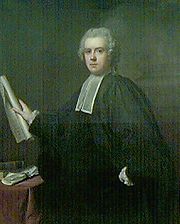
Francis Hargrave
Encyclopedia

Life
Hargrave was born in LondonLondon
London is the capital city of :England and the :United Kingdom, the largest metropolitan area in the United Kingdom, and the largest urban zone in the European Union by most measures. Located on the River Thames, London has been a major settlement for two millennia, its history going back to its...
, the son of Christopher Hargrave of Chancery Lane
Chancery Lane
Chancery Lane is the street which has been the western boundary of the City of London since 1994 having previously been divided between Westminster and Camden...
.
He entered as a student at Lincoln's Inn
Lincoln's Inn
The Honourable Society of Lincoln's Inn is one of four Inns of Court in London to which barristers of England and Wales belong and where they are called to the Bar. The other three are Middle Temple, Inner Temple and Gray's Inn. Although Lincoln's Inn is able to trace its official records beyond...
in 1760.
He came to prominence because of his performance in 1772, in Somersett's case
Somersett's Case
R v Knowles, ex parte Somersett 20 State Tr 1 is a famous judgment of the English Court of King's Bench in 1772 which held that slavery was unsupported by law in England and Wales...
, and shortly afterwards was made King's Counsel. Thereafter, he specialised in legal history and commentary and did not take further part in the abolitionist campaign. In 1797 he was made recorder of Liverpool, and for many years was treasurer of Lincoln's Inn and a leading parliamentary lawyer.
He fell ill, probably with Alzheimer's Disease
Alzheimer's disease
Alzheimer's disease also known in medical literature as Alzheimer disease is the most common form of dementia. There is no cure for the disease, which worsens as it progresses, and eventually leads to death...
, in 1813, and his legal collection was purchased by the government for £8,000 and deposited in the British Museum
British Museum
The British Museum is a museum of human history and culture in London. Its collections, which number more than seven million objects, are amongst the largest and most comprehensive in the world and originate from all continents, illustrating and documenting the story of human culture from its...
. He died in 1821 and was buried in the chapel of Lincoln's Inn.
Works
He published many works of legal history and amassed a substantial collection of legal books and manuscripts. His works were:- ‘An Argument in the case of James Sommersett, a Negro, wherein it is attempted to demonstrate the present unlawfulness of Domestic Slavery in England,’ 1772; 3rd edit. 1788. Also in Howell's ‘State Trials,’ vol. xx.
- ‘An Argument in Defence of Literary Property,’ 1774.
- ‘Coke upon Lyttleton,’ edited by F. Hargrave and Charles Butler, 1775.
- ‘State Trials from Henry IV to 19 George III,’ 1776, 11 vols.
- ‘A Collection of Tracts relative to the Law of England, from manuscripts by Hale, Norburie, Blackstone, Hargrave, and others,’ 1787.
- ‘Opinion on the case of the Duke of Athol in respect of the Isle of Man,’ 1788.
- ‘Brief Deductions relative to the Aid and Supply of Executive Power in cases of Infancy, Delirium, or other incapacity of the King,’ 1788, anonymous.
- ‘Collectanea Juridica: consisting of Cases, Tracts,’ &c., 2 vols. 1791–2. This includes the manuscript on the Star ChamberStar ChamberThe Star Chamber was an English court of law that sat at the royal Palace of Westminster until 1641. It was made up of Privy Counsellors, as well as common-law judges and supplemented the activities of the common-law and equity courts in both civil and criminal matters...
left by William Hudson. - ‘Sir M. Hale's Jurisdiction of the Lords' House of Parliament, with Preface by F. H.,’ 1796.
- ‘Juridical Arguments and Collections,’ 1797–9, 2 vols. The arguments in the Thellusson will case were reprinted from this work separately in 1799, and a new edition by J. F. Hargrave was published in 1842.
- ‘Address to the Grand Jury at the Liverpool Sessions on the present Crisis of Public Affairs,’ 1804.
- ‘Jurisconsult Exercitations,’ 1811–13, 3 vols.
A catalogue of his manuscripts was compiled by Sir Henry Ellis, and published in 1818.

